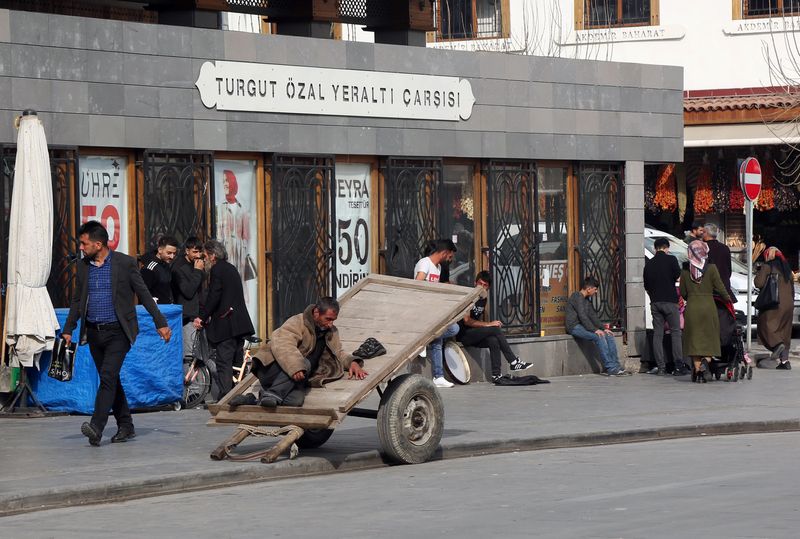By Ezgi Erkoyun and Ceyda Caglayan
ISTANBUL (Reuters) – Berkay Ucar has almost given up hope of finding work after his eight-month search only generated a few unsuccessful interviews.
Living with his parents in the capital Ankara, 24-year-old software developer Ucar, is one of a rapidly growing number of despondent job seekers in Turkey. For him, the mental toll of unemployment is larger than its financial burden.
“My salary and other expectations are at the minimum level, but I still can’t find a job. Psychologically it is very difficult for me. I am losing hope.”
Eighteen months into President Tayyip Erdogan’s abrupt pivot to economic orthodoxy, aggressive interest rate hikes and other tightening measures to tame soaring inflation are increasingly undermining job seekers’ prospects of finding employment.
The number of people who lost hope of finding work and who have stopped actively looking jumped by some 30% since the new economic programme was launched in June 2023, according to data by TUIK statistics institute.
Data shows there are more than 2.17 million people in this category in the third quarter who are not counted as unemployed.
Turkey’s unemployment rate stood at 8.6% in September, with around 3.1 million people looking for jobs, but economists say that this does not reflect the actual picture in the labour market and that the outlook for next year is much worse.
Turkey’s policy U-turn, ditching a previous low-rates policy championed by President Erdogan, is aimed at boosting exports, lowering inflation and rebalancing an overheating economy. But the economic pain created by a chronic cost-of-living crisis has dented his AK Party’s popularity.
The government is committed to the inflation fight now – with bullish foreign investors taking notice – but workers’ growing angst could test Erdogan’s resolve to stay the course next year, just as annual inflation is finally headed down.
Industrial output has dropped four months running and GDP growth slowed to 2.5% in the second quarter. The deteriorating demand outlook, along with high borrowing costs, has triggered company layoffs, notably in manufacturing, such as garments and textiles.
Finance Minister Mehmet Simsek has said this month the government is taking measures to limit the temporary negative impact of the economic programme and that increasing confidence and better global conditions will support jobs and exports.
FEELING HELPLESS
Sema, 29, who did not provide her full name, is one of those who have given up searching for work. She moved to Istanbul to find a job in advertising, but gave up hope and moved back to her parents house in western province Kutahya to save on rent.
“I have no money and I am in despair. I am not looking for a job anymore as I know there is nothing out there for me. I feel useless, helpless and unsuccessful, like I did something wrong somewhere,” she said.
Analysts say traditional unemployment data does not capture the scale of the problem and Aylin Ingenc Eker, a researcher at the Social Policy Research Center at TOBB ETU University in Ankara, calculates additional indices to get a truer picture.
According to her calculations, taking into account job quality and the impact of inflation, an index that analyzes economic difficulties people are experiencing has risen to near pandemic levels since the start of the new economic programme.
In the third quarter, employment increased by 136,000 people, which economists linked to the need for workers to rebuild areas hit by the devastating earthquake in February 2023 in southern Turkey and rising demand in the tourism sector.
Analysts say Ankara faces a major test of its commitment to reining in inflation at end-2024, when it is expected to again hike the minimum wage. A large rise would help workers claw back real income losses, but could stoke labour costs for businesses already struggling.
Economist Can Fuat Gurlesel said that a possible 25-30% increase in the minimum wage could cause firms to lay off staff but less than that will not be enough for employees.
The Turkish central bank forecasts year-end annual inflation of 44%.
“A 25% increase is manageable, but 30% is the maximum limit, the red line. I am not sure if all companies can handle that without laying off staff, especially in the manufacturing sector,” he said.
“No sector can afford a minimum wage increase of over 30% in this economy.”

































